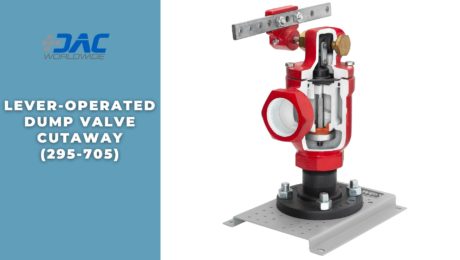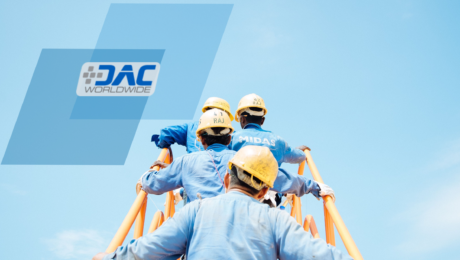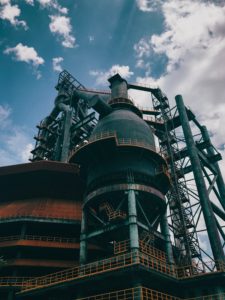DAC Worldwide Training Tool Provides Unique Insight into Common Valve
Today’s oil and gas workers need in-depth knowledge of and hands-on experience with a wide variety of different types of industrial valves commonly used in the oil and gas sector. When problems arise at an oil refinery, for example, you want skilled technicians able to troubleshoot and repair systems quickly to avoid a potentially dangerous situation.
One of the most common process controllers you’ll find in oil and gas facilities is the liquid level controller. This key device maintains the level of oil or gas in a container by opening or closing a valve known as a liquid dump valve.
Since the liquid dump valve is located near the level measurement device, it’s possible to use mechanical linkages to coordinate the position of a liquid level float in an oil and gas separator with the position of the liquid dump valve.
In a typical mechanical liquid level controller, the liquid level float that sits atop the liquid is connected to a rod that, in turn, connects to the liquid dump valve. As oil or gas level increases or decreases, the float moves the rod that then opens or closes the liquid dump valve.
For example, if the level of oil in a separator increases, the float will rise, causing the rod to open the liquid dump valve to release oil. Then, as the liquid level decreases and the float lowers, the rod will cause the liquid dump valve to begin to close to decrease the rate of liquid release.
Lever-operated dump valves can be found in a wide variety of oil and gas production containers, including separators, accumulators, treaters, and free water knockouts. To teach oil and gas workers how to maintain, troubleshoot, and repair these common valves, DAC Worldwide’s Lever-Operated Dump Valve Cutaway (295-705) is an actual industrial lever-operated oil dump valve that has been carefully sectioned and color-coded to expose and showcase the complete internal configuration of the valve.
Seal features and hardware locations have been retained, allowing for hands-on training in maintenance. Moreover, common valve makes and models are chosen to ensure industrial relevancy. All cleaning, priming, and painting uses a high-durability urethane coating to ensure this training tool will last for years.
The Lever-Operated Dump Valve Cutaway is only one of DAC Worldwide’s many oil and gas training cutaways. Visit DAC Worldwide online to learn more about other oil and gas training tools, such as the Diaphragm Dump Valve Cutaway, Piston Check Valve Cutaway, Oilfield Backpressure Regulator Cutaway, and many more!
- Published in News
What is Process Technology and why is it so important right now?
Process technology employees in the United States are the highly skilled operators of oil refineries, and the positions they hold require distinct training. Process technicians are responsible for monitoring and maintaining the production processes in a facility. They monitor equipment, operation, and safety systems, and are occasionally involved in the installation and repairing of equipment, like pumps, compressors, and electric motors. Students pursuing a career in process technology can often expect a good salary, job advancement opportunities, and an interesting, sometimes challenging, role using technology in manufacturing.
What is going on in the oil production industry?
Despite slowing growth, US oil production is on track to reach and all-time high in 2023. Output is expected to expand at an average rate of 840,000 barrels a day next year, down from a prior forecast of 860,000, according to the Energy Information Administration.
A reduction in supply from the United States could exacerbate an already fraught situation, in the midst of Vladimir Putin’s invasion of Ukraine, and subsequent sanctions and trade embargos. Previously the US was relied upon as a key ancillary producer, that can subsidize the global supply as demand increases. The US has an immediate need for properly trained Oil Industry professionals, in order to ramp up domestic oil production.
In an effort to attract the skilled workforce of the future, The American Petroleum Institute (API) announced a new initiative encouraging veterans and transitioning service members to apply their skills in the oil and gas industry. Per worldoil.com; ‘participants obtain professional credentialing through API’s Individual Certification Programs (ICP).’ API plans to develop additional programs and tools to help transitioning service members and veterans. More information can be found here.
A great deal of workers left the Oil industry following the onset of the COVID-19 pandemic. Currently, there are still roughly 100,000 fewer oil and gas workers now in the country than before the pandemic despite the U.S. unemployment rate has falling to 3.6%, slightly above the pre-pandemic low. Companies such as Patterson-UTI raised wages last year because of competition from retailers that historically paid less than the oil industry.
Rystad forecasts that U.S. oil and gas employment is expected to recover this year (2022), and surpass pre-pandemic figures to an oilfield workforce of almost 1.1 million by the end of 2027. By the end of this year, U.S. oil and gas employment is expected to expand 12.5% to almost 971,000.
Specialized workers are key to restoring the workforce needed to ramp up production. DAC Worldwide’s process control and instrumentation products provide hands-on training for multiple tasks including those associated with flow, level, and temperature controlled processes.
DAC Worldwide’s Vertical Separator Trainer (295-101) is a reduced-scale, three-phrase vertical separator that mimics its real-world counterpart by using alternate production stream components, refined oil, air, and water.
https://dacworldwide.com/product/vertical-separator-trainer/
DAC Worldwide’s Vertical Separator Training System Plus (295-101-PAC) is a realistic working demonstration separation system duplicates the process at a reduced scale using alternate production stream components: refined oil, air, and water. Three-phase separators, both vertical and horizontal, perform a fundamental purpose in oilfield production operations. Using very basic physical principles of gravity separation, the device efficiently separates mixed raw oil and gas production streams into their component parts: crude oil, gas, and water.
https://dacworldwide.com/product/vertical-separator-training-plus/
More Oil and Gas training solutions from DAC can be found here.
- Published in News






